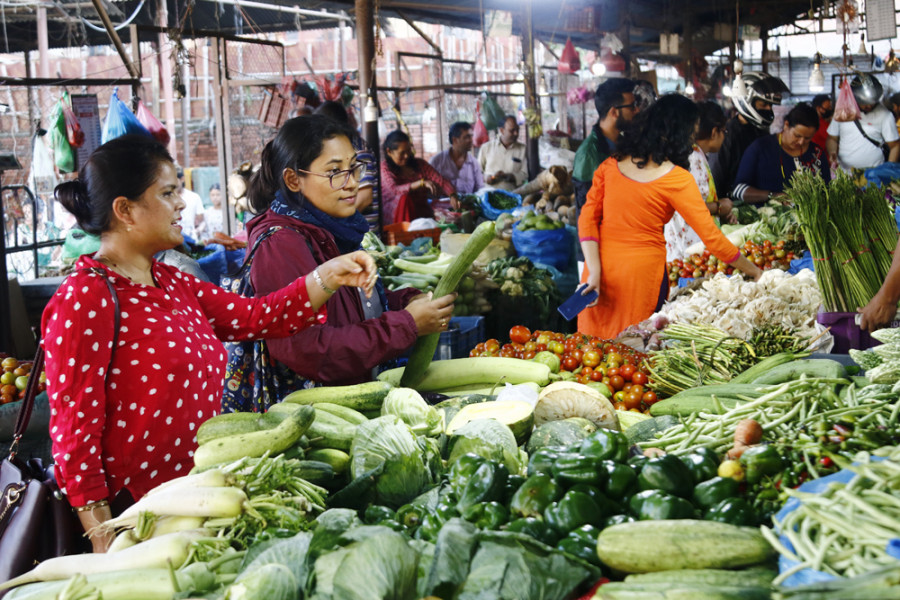Money
Slump in production and imports sends vegetable prices soaring
Traders attributed the price rise to a decline in local output, but consumer rights activists accuse middlemen of inflating the price.
Krishana Prasain
Vegetable prices went up by an average of 34 percent over a month due to lowered domestic production and a drop in imports from India, traders said.
Tomato big and small, potato red and white, onion, cabbage, cauliflower, eggplant, cowpea, bitter gourd, bottle gourd, pointed gourd and okra have all become dearer.
Traders attributed the price rise to a decline in local output, but consumer rights activists accuse middlemen of inflating the price by adding excessive mark-ups.
Resham Tamang, administrator of the Balkhu Fruits and Vegetables Market, said that shrinking production and reduced imports from India were the main reasons behind the higher price tags. “The domestic vegetable production system is more price-oriented than demand-oriented; and as a result, prices swing wildly from very high to very low.”
Binaya Shrestha, deputy director of the Kalimati Fruit and Vegetables Market Development Board, said 700-800 tonnes of vegetables were being delivered daily. Prices are down from pre-Dashain highs, but they are still expensive, he said.
According to the price list of the Kalimati Fruit and Vegetables Market Development Board, the price of cowpea long has surged by 70 percent to Rs145 per kg, while okra costs Rs125 per kg, a 66 percent jump over one month. Potato red now costs Rs78 per kg, up from Rs68 per kg a month ago.
Bitter gourd that cost Rs75 per kg last month has increased by 40 percent to Rs105 per kg, while the price of eggplant has increased by 26 percent to Rs95 per kg. Tomato big costs Rs105 per kg, an increase of 23 percent.
The vegetable market inspection done by the Department of Commerce, Supply and Consumer Protection Management on October 2 found that vegetable traders have not been issuing bills of sale to their customers. The government has made it mandatory for merchants to issue bills of sale, but vegetable traders have not been doing so, said rights activists.
The department said that it had not been able to conduct regular market inspection due to lack of resources, especially during festival time.
The price of onion has been on the high side since the Indian government banned exports of the vegetable. Onion dry costs Rs125 to Rs135 per kg. During the market inspection conducted before Dashain, officials saw that traders had started hoarding onions after finding out that the Indian government had banned exports. Nepal imports 99 percent of its onion requirements from India.
Tamang said that onions imported from China had slowly started arriving in the market. Nepal imports potato, onion and lemon throughout the year and green vegetables according to season and demand, said Tamang.
Vegetable prices fluctuate depending on the season and output, but they have consistently been on an upward trend for the last three months, with traders citing diverse reasons ranging from heavy rainfall to increased festival consumption. Consumer rights activists blame lack of regular and effective market inspection for the ever increasing prices.
Former agriculture secretary Suraj Pokharel said local market prices tend to increase with a fall in production in India. Since there are no production plans or a contract farming system, alternating overproduction and underproduction cause prices to swing widely.
For example, the price of tomato has remained at around Rs100 for three months. The high price encourages farmers to plant tomato during the same time next year. The resulting overproduction causes the price of tomato to crash. Lack of a contract farming system has also been a major reason behind fluctuating prices. “Vegetable traders and middlemen are taking these lapses as an opportunity to make a killing in the market,” Pokharel said.
Nepal imported vegetables worth Rs1.14 billion during the period mid-July to mid-August, according to a report of Nepal Rastra Bank. During the same time last year, imports amounted to Rs1 billion.




 9.51°C Kathmandu
9.51°C Kathmandu















